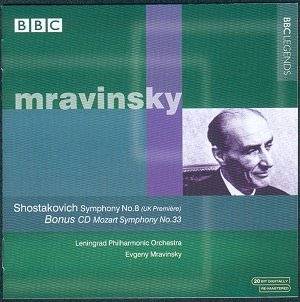
Both works were recorded live at the Royal Festival
Hall in London on 23 September 1960. The two CDs are offered together
at a slightly lower price than that of a single "full price"
CD, ample compensation for the relatively short overall playing time
of this set.
In his booklet notes, David Lloyd-Jones claims incorrectly
that Shostakovich’s Eighth Symphony "had not been heard at all
outside Russia" at the time of this recording: actually, the work had
already been played widely in the West, receiving its UK premiere as
early as 1944. However, Lloyd-Jones makes his comment merely to emphasise
the unfamiliarity of the symphony to the London audience, and thus the
consequent importance of this concert even on purely musical grounds,
let alone the significance of the Leningraders’ visit to Britain
during the early years of the Khrushchev era. Given the documentary
value of the recording, the disgraceful amount of coughing by the audience
is particularly regrettable, conjuring up as it does an image of people
who were keen to attend the orchestra’s concert as a novel social
occasion, but who had little interest in listening attentively to the
music itself.
20-bit digital remastering has ben used and although
the sound quality (stereo) is opaque in the heavily-scored passages,
the recording always conveys a convincing impression of a large orchestra
heard at a distance in a spacious concert hall environment. Mravinsky’s
1947 Melodiya recording (BMG 74321 294062) has poor sound even by the
standards of its time, being severely distorted at climaxes, and is
also transferred slightly below the correct pitch. His 1982 recording
was twice issued a full semitone sharp on Philips, which not only misrepresented
Mravinsky’s tempi but also falsified the tonal qualities of the
orchestra: despite hearing an hour-long symphony in the wrong key, no
reviewers noticed that anything was awry until news gradually circulated
about the faulty transfer, which hardly gives one confidence in their
critical judgement. The 1982 performance was also issued on the Icone
label, again at the wrong pitch, but it has been released at the correct
pitch elsewhere (Russian Disc RD CD 10917) and the latter is therefore
the only recommendable transfer. Three different dates for the performance
are given by the three companies who have issued it, but none of them
seem to be accurate, an obvious edit in the finale betraying that the
recording derives from more than a single performance. Although this
version has more brightness and clarity than the BBC issue, some artificially-close
balances in the 1982 engineering subtract from the realism of the sound,
but at least the audience here is unobtrusive.
Of the three performances, the 1947 version contains
the most epic traversal of the first movement, attributable mainly to
the tempo, which is particularly slow here, even allowing for the slightly-inaccurate
pitch and speed transfer. Nevertheless, the BBC’s 1960 version
has much to offer, with a breathtaking pianissimo at 1’02" which
is not attempted in the 1982 reading and a fearless presentation of
the central climax which is truly shocking in its impact, as it should
be. Throughout the symphony, the 1960 version is the fastest of the
three performances, notably so in the third movement, which stuns the
coughers into silence, being taken here much faster than in 1947 or
1982, so much so that the trumpets have to simplify their part at 3’59"
(played as written in 1947), a facilitation which is justifiable here
but which sounds merely lazy when repeated in the slower 1982 performance.
The 1947 rendition makes a strong impression here too, with very fierce
accenting from the strings near the end, the strength of their attack
evident despite the sound quality. Apart from twenty seconds of unpleasant
orchestral balance in the finale starting at 3’21" (not present
in the 1982 version) the playing of the 1960 version is excellent, with
only a few trivial flaws, none of them worth detailing. The same large
string section seems to be employed for the Mozart symphony, yet even
with such a potentially-unwieldy group Mravinsky maintains control over
details of phrasing, articulation and dynamics, so that although the
playing here is a far cry from current views as to 18th-century performance
style, there’s much to enjoy.
The inclusion of the Mozart symphony is unlikely to
influence your decision as to which version of the Shostakovich to buy;
for me, the distortion on the 1947 recording is less distracting than
the coughing during the 1960 performance, which seems to make even the
Leningraders lose their concentration in the fourth movement, played
rather routinely in 1960 in comparison with what was achieved in 1947.
The deficiencies of post-war Soviet sound technology are worth tolerating
for the sake of experiencing this symphony in a dauntingly-intense performance,
one which is of historic interest in that it dates from less than four
years after Mravinsky gave the world premiere in Moscow, and which provides
a greater emotional experience than the 1982 rendition, good though
that is. The 1960 version is an important and welcome release, but readers
will need to think twice before buying it if they find audience noises
as irritating as I do.

